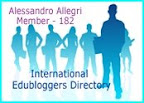Translation of post "Come diventare un insegnante alfabetizzato del XXI secolo" of March 14th 2008 on "Il deserto dei tartari 2.0".
In his blog, David Warlick suggests a twelve-step path to become "a 21st Century Literate Educator". I interpret that this century needs some instructions, a learning path for teachers born and raised in the previous one.
To summarize the twelve points:
- Create a group of teachers to work with.
- Have support from the school technical (ICT assistant).
- Subscribe some edu-bloggers feeds.
- Share work with your group.
- Read, study, discuss books.
- Plan regular group meetings.
- Open a social bookmarking account.
- Open a wiki for notes, links and directions.
- Join a specific Ning social network.
- Open your personal blog.
- Start experimenting in your class.
- Share your results.
 Italian version
Italian version




